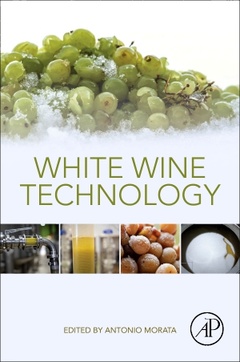White Wine Technology
Coordonnateur : Morata Antonio

2. White grape quality monitoring via hyperspectral imaging: from the vineyard to the winery
3. Use of GTH in the winemaking of white varieties
4. White must extraction
5. White must preservation by UHPH without SO2
6. Use of Pulsed Electric Fields in white grape processing
7. Ultrasounds to process white grapes
8. Settling. Must cleaning
9. Application of Hanseniaspora vineae to improve white wine quality
10. Improving white wine aroma and structure by non-Saccharomyces yeasts
11. Biological acidification by L. thermotolerans
12. Nitrogen management during Fermentation
13. Tasting the terroir of wine yeast innovation
14. Malolactic Fermentation
15. Pinking
16. Prevention of the light-struck taste in white wine
17. White wine polyphenols and health
18. Enzymes applications in white wines
19. NIR for white wine analysis
20. Ageing on lees
21. Barrel ageing of white wines
22. Use of different wood species for white wine production: wood composition and impact on wine quality
23. Impacts of phenolics and pre-fermentation antioxidant additions on wine aroma
24. A Glance through Aroma of White Wine
25. Inertization and bottling
26. White Winemaking in Cold Climates
27. White wine production in cold regions of China
28. Dealcoholization of white wines
29. White wine tasting: understanding taster responses based on flavour neuronal processing
- Covers trends in in both traditional and modern enology technologies, including extraction, processing, stabilization and ageing technologies
- Examines the potential impacts of climate change on wine quality
- Provides an overview of biotechnologies to improve wine freshness in warm areas and to manage maturity in cold climates
- Includes detailed information on hot topics such as the use of GMOs in wine production, spoilage bacteria, the management of oxidation, and the production of dealcoholized wines
Date de parution : 09-2021
Ouvrage de 430 p.
15.2x22.8 cm
Thème de White Wine Technology :
Mots-clés :
?Aging on lees; Alcohol; Alcohol reduction; Alcohol risks; Analytical methods; Anthocyanins; Antioxidant; Aroma; Aroma extraction; Aromatic compounds; Aromatic molecules; Aspergillus niger; Bacteria; Biocontrol; Biofilm; Biogeography; Biological acidification; Bottle burst; Bottle inspection; Broken glass; China; Clones; Cold region; Complexity; Composition; Continuous press; Dealcoholized wine; Decanters; Dejuicer; Dry inactive yeast preparations (DYP); Electroporation; Emotion; Enosophy; Environmental conditions; Enzymatic inactivation; Evolution; Extortion; Fermentation; Fermentation kinetics; Filler; Flavor; Flotation; Glucanases; Glutathione; Glycosidases; Glycosidic bound; Grape texture; HACCP; Harvest; Health; Hydroxycinnamates; Hydroxytyrosol; Hyperspectral imaging; Icewine; Inert pneumatic press; Infrared; Insects; Intensity; Juice clarification; Juice extraction; Labeling; Lachancea thermotolerans; Lactic acid; Lactic acid bacteria; Light-struck; Low- and reduced-alcohol wine; Low-input winemaking; Malolactic fermentation; Mass transfer; Matrix effects; Maturity assessment; Melatonin; Metabolism; Methionine; Methoxypyrazines; Microbial inactivation; Microbial terroir; Microbiome; Microorganisms; Microplastic; Minimal intervention; Mixed cultures; Mixed fermentation; Must clarification; Must conservation; Near infrared; Nitrogen; Non-Saccharomyces; Oak barrels; Oak chips; Oak species; Osmotic distillation; Oxidation; PH control; Pasteurization; Pectinases; Persistence; Phenolics; Pinking; Polyphenols



